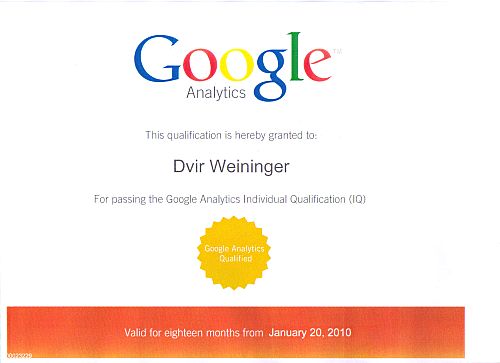4 Questions with Avinash Kaushik: Kick-Ass Web Analytics
Avinash Kaushik is a best-selling author, co-founder of Market Motive Inc. and is the analytics evangelist for Google. You can catch Avinash as a keynote speaker for the upcoming SES Conference in Chicago on October 19. I was very fortunate to grab some of Avinash's time to answer a few questions on the minds of search marketers relating to Web analytics. Enjoy this insightful interview!
1. Do you think analytics metrics such as bounce rate and time on page are playing a more vital role in keyword selection versus just high-traffic volume?
Bounce rate is just a diagnostic metric. From a website visitor's perspective, it reports on this phenomenon: "I came. I puked. I left."
It is very good at quickly identifying places where one of two things are happening:
1. You are targeting the wrong keywords or promising wrong things in your ads, etc.
2. Your landing pages are broken, wrong calls to action/missing content/wrong page, etc., etc.
In that sense, bounce rate helps you start finding things to fix or stop doing very quickly. But all it does is find those places. You still have to do a lot of digging to find out what's wrong.
Time on page is a tricky metric because if you have a standard implementation of *any* Web analytics tool, then they don't provide you the time on page for visits with single-page views.
For more detail on this, see this post: "Standard Metrics Revisited: #4: Time on Page & Time on Site."
So, it is not that these metrics by themselves are playing a more vital role, because while they are great diagnostic metrics (at least bounce rates), they are simply not strategic enough.
The movement I do see, amongst the smart and cool, is a movement to deeper outcome metrics in picking keywords. Moving beyond click-through rate, or clicks or visits, to conversion rate and number of micro conversions to - and this is the sexiest - profit per dollar spent for each keyword.
We are not just asking, "Will people come to my site if I advertise?" We are asking, "What will those people do for my business if I spend time and love to attract them?"
2. Do you think search engines monitor analytics metrics such as time on site and bounce rate for any given website and then alter SERP placement based on the results of those metrics?
No.
Bing, Google and Baidu don't have analytics tools or data capture mechanisms sitting on your site to compute time on site, etc. to then help them use those signals. Signals that the search engines like Google are using are page load time, which is available via the Googlebot visit.
3. Now that Google Instant has officially launched, from an analytics perspective, has anything changed with the way we need to run analytics and what should we be looking for in the future?
Not much, honestly.
It is too early to tell what the definitive impact will be, but the types of things I am looking at are analyzing the data for top ("head") keywords to see any traffic impact (almost none), looking for a diversity in the queries delivering traffic to the site (Is it still majorly what it was before or are Google's predictive suggestions driving slightly different queries?) and segmenting clicks from results previous on Page 2 to see if Page 2 and beyond are still relevant or not (if not, then double down on SEO! : ).
From a PPC perspective, a valuable exercise is to analyze the impact on impressions and from impressions to clicks to see what might be happening in your own account (Rather than believing some of the FUD that exists out in our beautiful blogosphere!).
There is no new data that Google is passing to the Web analytics tools in the referring URL, hence all the data that you are getting before and after is the same. You should be able to do all the analysis above for SEO and PPC without having to do extra technical work on your site and do it with whatever Web analytics tool you are currently using.
4. What are the top five key performance indicators that search professionals should be most concerned with to show value of a campaign to their clients or management?
All my warm hugs and kisses are reserved for any search marketer that obsesses about outcome metrics: Revenue. Profit. Number of leads converted after 30 days. Enhanced visitor loyalty (for non-ecommerce sites). Repeat purchases in subsequent 60 days, etc., etc.
It pains me that more of our community does not obsess about outcome metrics; we are far too charmed by activity.
If you want to build a robust measurement program for search, you should focus on acquisition (click-through rate, lost impression share, etc.), site efficiency (bounce rates, cart/checkout abandonment rates, etc.) and outcome metrics (the ones mentioned above).
Having an end-to-end view is great in helping you find opportunities faster. But in the end, my love is reserved for those who 1) Understand what outcomes they are delivering for the client/business and 2) Obsess about delivering those outcomes.
It is not always easy, but if it was easy, could you charge $300 an hour doing it? : )
Originally published Here

Google Analytics Certificate from the professionals at CMS Buffet, Toronto SEO Company
Choose Font Size:
Recently Launched Sites
Cam-Bag.Com
Do you love to take outdoor photographs? Be prepared with one of the Camera and Laptop Bags from Cam Bag. With storage solutions, organization, safety, and security, you will be ready for anything.
Contact Us:
Phone: 647-477-2992Email: info @ CmsBuffet.Com
Helping You Achieve Web Visibility.


